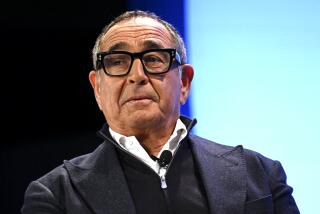Lobbyist Pleads Guilty to Illegal Contribution
- Share via
A lobbyist representing a leading Southern California billboard company pleaded guilty Monday in U.S. District Court to giving a $7,500 “illegal gratuity” in 2001 to then-Lynwood Mayor Paul H. Richards to help win his support for a deal sought by the firm, Regency Outdoor Advertising.
The lobbyist, David Neal Smith, also agreed to cooperate with the government in an ongoing public corruption probe and was expected to testify as a government witness in Richards’ trial, which is scheduled to begin next week.
Richards, who was known for years as the most influential person in Lynwood politics and was also a significant presence in the politics of neighboring Compton, is charged with directing a broader bribery scheme.
He is charged with arranging for Lynwood to divert $1 million of a prospective $5 million fee from Regency to a firm owned by his sister. He also allegedly arranged for his sister’s firm to share in other city contracts, for which the firm did no significant work. He and his sister, Paula Cameo Harris, have pleaded not guilty.
The Regency deal, which would have authorized the firm to erect billboards along the Century Freeway, was never realized. A City Council majority that Richards controlled approved the plan. But after Richards lost control of the City Council following elections in late 2001, his political enemies canceled it.
According to a statement of facts agreed to by Smith and by prosecutors and filed in federal court Monday, Smith was associated with the lobbying firm Ken Spiker & Associates, which was representing Regency.
The Century Freeway, where Regency’s billboards would have been prominently displayed, divides Lynwood, a city of 70,000 in southeastern Los Angeles County.
As negotiations over the billboard deal were taking place, the statement says, Richards told Smith that he needed financial support for his November 2001 reelection bid.
Smith said he gave that message to Regency’s president, Drake Kennedy, and to his boss, Ken Spiker Jr. The lobbying firm then sent Regency an invoice for $25,000 in “consulting fees.”
Four days later, Smith said, he and Spiker told Richards that they would raise $50,000 for his campaign. Smith and Spiker each agreed to provide $12,500, Smith said. He said Regency was to provide the other $25,000 through the “so-called ‘consulting fees’ ” billed four days earlier.
As the election approached, public records show, Smith and Spiker largely kept their parts of the bargain, with Smith giving $12,500 to Richards and Spiker giving $12,000.
Spiker’s lobbying firm was credited in campaign reports with giving an additional $20,000. But the reports make no mention of Regency.
Of the donations, $7,500 from Smith and $7,000 from Spiker went to a dormant Richards campaign committee that he had begun for a 1992 state Senate race. Prosecutors said Richards used some money from that committee for personal expenses. Smith told prosecutors that Richards directed him to contribute to that committee and that he understood at the time that Richards probably would personally benefit from the funds.
Calls to Drake Kennedy, his attorney, Brian Hennigan, and his spokesman, Mark Saylor, were not returned. Calls to Spiker also were not returned. Neither Regency nor Spiker & Associates has been charged with wrongdoing.
Spiker & Associates is a major Southern California lobbying firm that provides administrative services to the Independent Cities Assn., a group of more than 50 small cities including Lynwood, and has billed clients in Los Angeles $1.5 million since 2003, records show. Clients include taxi, parking and billboard companies.
Smith, 64, of Palmdale, also admitted as part of his plea deal that he lied to a federal grand jury investigating Richards when he testified that he had donated the money because he liked him, not to further the billboard deal.
He faces a possible 10 years in prison when he is sentenced in January.
However, prosecutors agreed to ask for a lesser sentence based on his cooperation.
More to Read
Sign up for Essential California
The most important California stories and recommendations in your inbox every morning.
You may occasionally receive promotional content from the Los Angeles Times.













